Jonathan Bailor says "The more someone claims to know everything there is to know about food and nutrition, the less they know about food and nutrition, because for any of these extremely complicated areas of life like nutrition, exercise, psychology, quantum physics, actual experts will be the first to tell you there’s a lot we don’t know. When you don’t know that much, you err on the side of practicality. Practicality tells us very simply, what do healthy cultures eat consistently? Healthy cultures eat foods found directly in nature."
As the titles of Michel Dogna’s books state: “Prenez en main votre santé” (take your health into your own hands), it is necessary for everyone to take charge of their health. Doctors and therapists are there to help and advise you, but you shouldn’t blindly obey them out of fear. Stress caused by the doctor’s or therapist’s judgement is precisely what prevents us from recovering. The feeling that should fill the patient is hope and modesty when facing the extraordinary perfection and complexity of the human body. Apart from that, the patient would need positive energy, encouragement and support.
We must listen to our body, but we are disconnected from our body for different reasons:
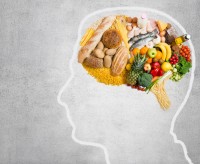 1.- Our mind. Our mind is more powerful than our body, it can control or disable any physical need. Fortunately, this is one of the features that differentiate us from animals. Mentally balanced people can control their physiological needs, sex drive, violence and of course, their hunger. However, this distinction is a result at the expense of losing our instinct about what food is benefitial for the body at any given time and excessively retaining physiological needs, which may result in constipation. Furthermore, we may drink excessive amounts (for example when the doctor tells us to drink three litres a day) or too few liquid.
1.- Our mind. Our mind is more powerful than our body, it can control or disable any physical need. Fortunately, this is one of the features that differentiate us from animals. Mentally balanced people can control their physiological needs, sex drive, violence and of course, their hunger. However, this distinction is a result at the expense of losing our instinct about what food is benefitial for the body at any given time and excessively retaining physiological needs, which may result in constipation. Furthermore, we may drink excessive amounts (for example when the doctor tells us to drink three litres a day) or too few liquid.
2. Our beliefs. From an early age they breed into us what is beneficial and what is harmful. Teachers at school, parents, advertisements and television programs, religion, culture of our times in general, friends, doctors, and nowadays the Internet too. As well as our mind, having a belief also elevates us as people, but we are disconnected from our physical needs. We no longer listen to our body, we listen to doctors, nutritionists, friends, family members, our dogma of faith, etc.
Because of these factors, we can find a situation where for example, a person needs meat and fish protein, but because of his beliefs and mind, he thinks that being a vegetarian is better for his health. Or conversely, a person needs to go through a time of cleansing to remove toxins from the body with a vegetarian diet, and yet continues eating a lot of meat because his nutritionist suggests that in order to lose weight he should follow a high protein diet, or a person that follows a high grains diet because he has converted to Buddhism and follows a macrobiotic diet.
It's very important to question every dietary dogma, mostly the ones we find on Internet or other sorces. Dr. David Katz gives a very wise advice: "Don’t just read opinions that confirm your own. If all you read is the stuff that agrees with what you want to believe in the first place, you’re taking a biased approach and not likely to wind up with a balanced perspective. You’ve got to read the best stuff that disagrees with what you’re hoping is true. Then, if you can still believe what you wanted to believe, it may be robust."
Sometimes the problem is not listening to our body, but that the body sends false messages. In this case the body is in a state of dependence of certain foods. We might even talk about an addiction. This may happen for several reasons:
1.- There is excessive proliferation of undesirable or pathological bacteria in the gut, which produce certain neuro-toxins that activate the receptors of well-being. This happens, for example, in case that there is a yeast infection such as Candida, which causes these pleasurable substances when they are fed with sugar and carbohydrates. Therefore, it is very difficult to cut down on sugar and carbs when there is a yeast infection. But as mentioned above, our mind is much more powerful than our body, so we can achieve the goal! Many people manage to do so, even though it is hard.
2.- There is an enzyme defect which prevents proper digestion of certain foods, such as gluten and casein. In this case, these proteins become opioid peptides that alter brain neurotransmission, and also cause an addiction. This situation can even lead to certain psychological and neurological diseases.
In both cases, external control of the body is necessary: the mind or an other person who is a close friend could help us to go on a diet. In the case of children the parents can help, adults may need the intervention of their partner or a close family member.
But when it is the mind that has wrongly decided for our body about our diet, the problem is that we would need to get rid of all preconceived ideas about nutrition and put them all in doubt, which is not evident. How can we achieve it? How can we reconnect to our bodies?
To begin with, you need to relax before eating. Disconnect from the environment: work, news on TV, phone, friends, colleagues or family. Eating alone for a few days, almost in a state of meditation, is what is called conscious eating. In order to do this:
From this point we can doubt all types of diets: vegetarianism, raw food, hyper-protein diet, paleo diet, macrobiotic diet, etc. There are valid arguments that defend all of them, so how to choose which is the best? In addition, within each type of diet, there are so many different variants as nutritionists exist on earth.
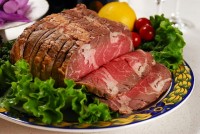 A suggestion is to simply try it for a while. If that style of nutrition improves your physical and psychological health, that indicates that it is a good diet. If it gets worse, it might be a detoxification reaction, a temporary worsening before improving, which happens in numerous therapies. So it is necessary to test them for a while. Typically, if the worsening lasts too long and gets worse and worse it is an intolerance, but if it is only temporary, then it is simply a detoxification reaction.
A suggestion is to simply try it for a while. If that style of nutrition improves your physical and psychological health, that indicates that it is a good diet. If it gets worse, it might be a detoxification reaction, a temporary worsening before improving, which happens in numerous therapies. So it is necessary to test them for a while. Typically, if the worsening lasts too long and gets worse and worse it is an intolerance, but if it is only temporary, then it is simply a detoxification reaction.
In the opposite sense, just because something makes you feel good (at first) does not mean it is good for you. It could be that it’s stimulating and enervating you and setting the stage for disease. Amphetamines, also know as “uppers,” definitely give a feeling of well-being. Yet, they do not bring health and, in fact, are extremely detrimental to the health.
A nutritionist-therapist can guide you in order to find out if it is a detoxification reaction or a diet that does not suit you. If there doesn’t occur any change with the new diet, it usually indicates that it is not the appropriate one.
Intolerances and nutritional needs evolve in life. A person does not have the same needs in childhood, adolescence, adulthood or in old age. Sometimes it can happen that during a phase of life a certain diet is more adequate, for example, a vegetarian diet when the body needs a detox, or a hyper-protein one when the body is malnourished. The necessary diet changes for everyone throughout life. While a person has a certain disease, whether chronic or acute, a therapeutic diet is required, which may be different from the maintenance diet that is adequate when the person is healthy.
Dietary therapy also depends on the type of disease. For example, Dr. Campbell - McBride designed the GAPS diet for people with neurological diseases, which is a diet where sugar and cereals are removed; while the most famous diet for cancer patients is the Gerson diet based on vegetable juices; diet for people with epilepsy is the ketogenic diet which is high in fat, or the Failsafe diet, where most fruit and vegetables are removed because of their phenol content; etc.
 It may also be that a person thinks that a change to his/her daily diet might do good. For example, you may decide to eat vegetarian food one day a week for a weekly detox, or the same way you can fast once a month, which I would personally recommend doing.
It may also be that a person thinks that a change to his/her daily diet might do good. For example, you may decide to eat vegetarian food one day a week for a weekly detox, or the same way you can fast once a month, which I would personally recommend doing.
Your best doctor is you. If we talk about children, their best doctors are their parents. The best option in order to become healthy is to study nutrition ourselves, so we can decide what foods are best for us and for our children. But for this it is necessary for the person to be properly instructed on different approaches to nutrition, to know "where to start" and what foods/substances could be suspected. A nutritional therapist can help make these decisions, especially when we do not have time to study nutrition. However, the number of variables and factors that have an influence in finding the adequate diet is so extensive that our certain participation in the process is always required.
1.- Different diets suit different people.
Different diets are best for each one of us. Surely members of the same family, for example a parent and the children keep a greater similarity compared to another person, but even so it will differ due to different genetics and a different environment.
2.- The traditions and the country we come from.
The children of parents who come from different countries and races have it much more difficult to determine what type of food is best for them. We should also consider whether distant ancestors come from a different area of the planet. For example, if you come from a Mediterranean country the best for you is olive oil, fruit and vegetables such as citrus and artichokes; while if you come from northern Europe for you it is better to consume canola oil or animal fat; apple as fruit; and cabbage as vegetable. And if you come from Asia then rice, seaweed and fish will likely be your staple food.
3.- The country where you live and its climate.
If you have grown up in a Mediterranean country perhaps fruit suits you better, but if you currently live in a Central or Northern European country, fruit might not be the best choice anymore, but you may need more fat.
4.- The season of year:
the food which is available in winter is not the same as in summer. In summer we usually eat more vegetables and fruit, especially raw ones, while in winter, due to the shortage of vegetables and fruit during the cold season, it is preferable to eat meat or fish broth which are rich in fat and protein.
5.- Medical conditions you have undergone:
vaccines, exposure to heavy metals, drugs, etc. Furthermore, stressful conditions, hospitalization, illness, etc., which may have influenced the appearance of different kinds of intolerance. Certain conditions of fatigue, stress, emotional conflicts, etc. can influence the intolerances so that they become more or less severe, depending on the day.
The barrier between unhealthy and intolerant food is very diffuse. There are certain foods which virtually all nutritionists describe as unhealthy foods, but most of the foods can be healthy for certain nutritionists and unhealthy for others.
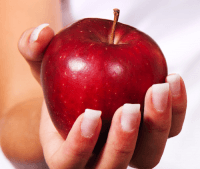 Absolutely all foods have beneficial and harmful properties. Think of any kind of food, for example the healthiest one there is, broccoli. Broccoli is one of the foods with most virtues: one of the richest in antioxidants, it can detoxify heavy metals, it contains numerous vitamins and minerals, etc. But phenoles and flavonoids that act as antioxidants are substances in plants that help protect against insects, so they are also toxic and there are many people who do not tolerate this kind of substances. Broccoli also contains a lot of sulphur needed in the detoxification process, but when there is an overgrowth of sulphate-reducing bacteria then sulphur is metabolised into sulphites, which is toxic. Another example is apple, also an ultimate healthy food. So many people suffer from flatulence when eating apples, due to an intolerance to soluble fibre which are highly fermentable, or due to a fructose intolerance.
Absolutely all foods have beneficial and harmful properties. Think of any kind of food, for example the healthiest one there is, broccoli. Broccoli is one of the foods with most virtues: one of the richest in antioxidants, it can detoxify heavy metals, it contains numerous vitamins and minerals, etc. But phenoles and flavonoids that act as antioxidants are substances in plants that help protect against insects, so they are also toxic and there are many people who do not tolerate this kind of substances. Broccoli also contains a lot of sulphur needed in the detoxification process, but when there is an overgrowth of sulphate-reducing bacteria then sulphur is metabolised into sulphites, which is toxic. Another example is apple, also an ultimate healthy food. So many people suffer from flatulence when eating apples, due to an intolerance to soluble fibre which are highly fermentable, or due to a fructose intolerance.
In general, the higher the nutritional content of food, the greater its anti-nutrient content. In the plant world, these precious nutrients are protected with anti-nutrients. Other examples are spinach, with very high content of oxalates, or chocolate containing a large amount of oxalates, histamine and alkaloids, or whole grains and pulses that contain oxalates too and phytates, lectins, saponins and agglutinins.
So we can not say that some kinds of food are beneficial for everyone. Each one of us needs different foods, different foods suit different people, thus we should follow different diets.
That is why I prefer to classify foods that are not harmful as tolerant and intolerant foods.
First of all, we can start by excluding certain food products from our diet that are undoubtedly harmful to health:
We also have to consider foods according to their probability of creating different kinds of intolerance:
High probability: grains with gluten, legumes (including soybeans), dairy products, seeds
Medium probability: eggs, gluten free grains, nuts, fruit, some vegetables such as nightshades (potato, eggplant, pepper, tomato) and cruciferous (cabbage, kale, Brussels sprouts, cauliflower, broccoli, cress, canola, mustard, radish, turnip) and seafood
Low probability: meat, fish, most vegetables
So first of all, you must eliminate all the food that is unhealthy, and then, the food that you are intolerant. Then it will remain a basic staple products for you.
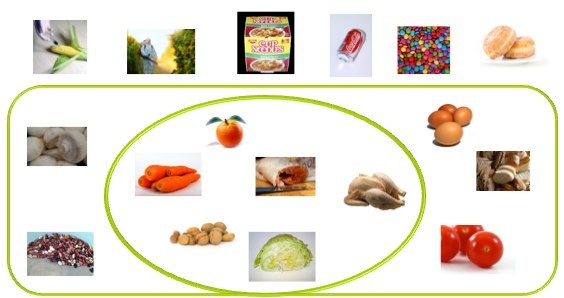
The problems they can create are not only gastrointestinal, but any kind of inflammatory disease (ENT diseases, rheumatic diseases, fibromyalgia, cardiovascular diseases, autoimmune and allergic diseases) and neurological or hormonal diseases, etc. are likely to be caused.
In this article you can read different strategies for identifying intolerances.
So far the questions of what foods to eat and what foods not to eat have been addressed. However, there are many other factors that influence good nutrition:
In order to know yourself it is important to challenge your body, dare to make dietary changes, to question all preconceived ideas and try different diets. Combining all strategies usually gives better results: it can involve doing analyses, seeking the advice of a nutritional therapist and embarking on elimination/reintroduction diets.
As the titles of Michel Dogna’s books state: “Prenez en main votre santé” (take your health into your own hands), it is necessary for everyone to take charge of their health. Doctors and therapists are there to help and advise you, but you shouldn’t blindly obey them out of fear. Stress caused by the doctor’s or therapist’s judgement is precisely what prevents us from recovering. The feeling that should fill the patient is hope and modesty when facing the extraordinary perfection and complexity of the human body. Apart from that, the patient would need positive energy, encouragement and support.
Recovering the natural instinct for food
We must listen to our body, but we are disconnected from our body for different reasons:
 1.- Our mind. Our mind is more powerful than our body, it can control or disable any physical need. Fortunately, this is one of the features that differentiate us from animals. Mentally balanced people can control their physiological needs, sex drive, violence and of course, their hunger. However, this distinction is a result at the expense of losing our instinct about what food is benefitial for the body at any given time and excessively retaining physiological needs, which may result in constipation. Furthermore, we may drink excessive amounts (for example when the doctor tells us to drink three litres a day) or too few liquid.
1.- Our mind. Our mind is more powerful than our body, it can control or disable any physical need. Fortunately, this is one of the features that differentiate us from animals. Mentally balanced people can control their physiological needs, sex drive, violence and of course, their hunger. However, this distinction is a result at the expense of losing our instinct about what food is benefitial for the body at any given time and excessively retaining physiological needs, which may result in constipation. Furthermore, we may drink excessive amounts (for example when the doctor tells us to drink three litres a day) or too few liquid.2. Our beliefs. From an early age they breed into us what is beneficial and what is harmful. Teachers at school, parents, advertisements and television programs, religion, culture of our times in general, friends, doctors, and nowadays the Internet too. As well as our mind, having a belief also elevates us as people, but we are disconnected from our physical needs. We no longer listen to our body, we listen to doctors, nutritionists, friends, family members, our dogma of faith, etc.
Because of these factors, we can find a situation where for example, a person needs meat and fish protein, but because of his beliefs and mind, he thinks that being a vegetarian is better for his health. Or conversely, a person needs to go through a time of cleansing to remove toxins from the body with a vegetarian diet, and yet continues eating a lot of meat because his nutritionist suggests that in order to lose weight he should follow a high protein diet, or a person that follows a high grains diet because he has converted to Buddhism and follows a macrobiotic diet.
It's very important to question every dietary dogma, mostly the ones we find on Internet or other sorces. Dr. David Katz gives a very wise advice: "Don’t just read opinions that confirm your own. If all you read is the stuff that agrees with what you want to believe in the first place, you’re taking a biased approach and not likely to wind up with a balanced perspective. You’ve got to read the best stuff that disagrees with what you’re hoping is true. Then, if you can still believe what you wanted to believe, it may be robust."
Sometimes the problem is not listening to our body, but that the body sends false messages. In this case the body is in a state of dependence of certain foods. We might even talk about an addiction. This may happen for several reasons:
1.- There is excessive proliferation of undesirable or pathological bacteria in the gut, which produce certain neuro-toxins that activate the receptors of well-being. This happens, for example, in case that there is a yeast infection such as Candida, which causes these pleasurable substances when they are fed with sugar and carbohydrates. Therefore, it is very difficult to cut down on sugar and carbs when there is a yeast infection. But as mentioned above, our mind is much more powerful than our body, so we can achieve the goal! Many people manage to do so, even though it is hard.
2.- There is an enzyme defect which prevents proper digestion of certain foods, such as gluten and casein. In this case, these proteins become opioid peptides that alter brain neurotransmission, and also cause an addiction. This situation can even lead to certain psychological and neurological diseases.
In both cases, external control of the body is necessary: the mind or an other person who is a close friend could help us to go on a diet. In the case of children the parents can help, adults may need the intervention of their partner or a close family member.
But when it is the mind that has wrongly decided for our body about our diet, the problem is that we would need to get rid of all preconceived ideas about nutrition and put them all in doubt, which is not evident. How can we achieve it? How can we reconnect to our bodies?
Conscious eating
To begin with, you need to relax before eating. Disconnect from the environment: work, news on TV, phone, friends, colleagues or family. Eating alone for a few days, almost in a state of meditation, is what is called conscious eating. In order to do this:
- Perform some breathing exercises to relax before eating. You can even do a bit of meditation.
- Focus on the sensations of the body before, during and after the meal. Ask the following questions:
- Am I really hungry? Analyze whether the stomach is moving and making "noises" indicating that it is hungry, or you are simply going to eat because it's time to eat.
- What am I hungry for? What kind of food do I feel like eating? Maybe just a salad, meat, or rice? Is it really my body that is asking for this food or are my preconceptions telling me to eat it?
- Once you have identified that the body really needs to eat, as well as what you need to eat, then you can proceed to prepare. For the preparation of the majority of healthy food there is no need to spend much time in the kitchen. You can always have some cooked rice or legume in the fridge, it will keep for two or three days. Even if you don’t have much time, you can prepare some salad, vegetables, meat, fish or eggs as it is all fairly quick to make.
- Cooking our own food opens the senses and helps stimulate the digestive system. Also, if done consciously, and prepared with love, having positive thoughts in the meantime, vitamin L (love) is also added to food.
- If you believe in any religion or simply in the power of mind, giving thanks for the food you are going to eat and blessing it increases the positive energy or the vitamin L of the meal even more.
- Eat consciously : taste the food, focus on the smell, texture, presentation (color, shape), taste and temperature. Chew slowly.
- Be aware so that you notice when you are full and stop eating at that moment. If there is still some food on your plate, just store it in the fridge, there is no need to eat it all up.
- Again, give thanks for the food that has been eaten. Visualize how food is digested properly to its elemental parts (for exaple, imagine some scissors that are cutting food up to elementary substances), and how these are then distributed throughout the body transported by the blood to feed all cells of your body.
- After eating, pay attention to the reactions of your body: are you starting to have gases, pain or noise in the belly, or is there a sensation of satisfaction and renewed energy? Be aware of all the possible symptoms (pain anywhere in the body, immune reactions, heart, etc.), both immediately after eating and a few hours later. In case any symptoms occur at any point, write down everything that you have eaten in the past 48 hours. You should perform this exercise for some time until you are able to eat consciously without much concentration, being accompanied by others. Once you have reconnected to your body and you can free yourself from preconceived ideas and try new styles of eating with an open mind and receptive body, you can start to distinguish which foods are beneficial and which are harmful for you.
Testing different diets
From this point we can doubt all types of diets: vegetarianism, raw food, hyper-protein diet, paleo diet, macrobiotic diet, etc. There are valid arguments that defend all of them, so how to choose which is the best? In addition, within each type of diet, there are so many different variants as nutritionists exist on earth.
 A suggestion is to simply try it for a while. If that style of nutrition improves your physical and psychological health, that indicates that it is a good diet. If it gets worse, it might be a detoxification reaction, a temporary worsening before improving, which happens in numerous therapies. So it is necessary to test them for a while. Typically, if the worsening lasts too long and gets worse and worse it is an intolerance, but if it is only temporary, then it is simply a detoxification reaction.
A suggestion is to simply try it for a while. If that style of nutrition improves your physical and psychological health, that indicates that it is a good diet. If it gets worse, it might be a detoxification reaction, a temporary worsening before improving, which happens in numerous therapies. So it is necessary to test them for a while. Typically, if the worsening lasts too long and gets worse and worse it is an intolerance, but if it is only temporary, then it is simply a detoxification reaction.In the opposite sense, just because something makes you feel good (at first) does not mean it is good for you. It could be that it’s stimulating and enervating you and setting the stage for disease. Amphetamines, also know as “uppers,” definitely give a feeling of well-being. Yet, they do not bring health and, in fact, are extremely detrimental to the health.
A nutritionist-therapist can guide you in order to find out if it is a detoxification reaction or a diet that does not suit you. If there doesn’t occur any change with the new diet, it usually indicates that it is not the appropriate one.
Intolerances and nutritional needs evolve in life. A person does not have the same needs in childhood, adolescence, adulthood or in old age. Sometimes it can happen that during a phase of life a certain diet is more adequate, for example, a vegetarian diet when the body needs a detox, or a hyper-protein one when the body is malnourished. The necessary diet changes for everyone throughout life. While a person has a certain disease, whether chronic or acute, a therapeutic diet is required, which may be different from the maintenance diet that is adequate when the person is healthy.
Dietary therapy also depends on the type of disease. For example, Dr. Campbell - McBride designed the GAPS diet for people with neurological diseases, which is a diet where sugar and cereals are removed; while the most famous diet for cancer patients is the Gerson diet based on vegetable juices; diet for people with epilepsy is the ketogenic diet which is high in fat, or the Failsafe diet, where most fruit and vegetables are removed because of their phenol content; etc.
 It may also be that a person thinks that a change to his/her daily diet might do good. For example, you may decide to eat vegetarian food one day a week for a weekly detox, or the same way you can fast once a month, which I would personally recommend doing.
It may also be that a person thinks that a change to his/her daily diet might do good. For example, you may decide to eat vegetarian food one day a week for a weekly detox, or the same way you can fast once a month, which I would personally recommend doing.Your best doctor is you. If we talk about children, their best doctors are their parents. The best option in order to become healthy is to study nutrition ourselves, so we can decide what foods are best for us and for our children. But for this it is necessary for the person to be properly instructed on different approaches to nutrition, to know "where to start" and what foods/substances could be suspected. A nutritional therapist can help make these decisions, especially when we do not have time to study nutrition. However, the number of variables and factors that have an influence in finding the adequate diet is so extensive that our certain participation in the process is always required.
Variables to consider in the process of getting to know yourself
1.- Different diets suit different people.
Different diets are best for each one of us. Surely members of the same family, for example a parent and the children keep a greater similarity compared to another person, but even so it will differ due to different genetics and a different environment.
2.- The traditions and the country we come from.

The children of parents who come from different countries and races have it much more difficult to determine what type of food is best for them. We should also consider whether distant ancestors come from a different area of the planet. For example, if you come from a Mediterranean country the best for you is olive oil, fruit and vegetables such as citrus and artichokes; while if you come from northern Europe for you it is better to consume canola oil or animal fat; apple as fruit; and cabbage as vegetable. And if you come from Asia then rice, seaweed and fish will likely be your staple food.
3.- The country where you live and its climate.
If you have grown up in a Mediterranean country perhaps fruit suits you better, but if you currently live in a Central or Northern European country, fruit might not be the best choice anymore, but you may need more fat.
4.- The season of year:
the food which is available in winter is not the same as in summer. In summer we usually eat more vegetables and fruit, especially raw ones, while in winter, due to the shortage of vegetables and fruit during the cold season, it is preferable to eat meat or fish broth which are rich in fat and protein.
5.- Medical conditions you have undergone:
vaccines, exposure to heavy metals, drugs, etc. Furthermore, stressful conditions, hospitalization, illness, etc., which may have influenced the appearance of different kinds of intolerance. Certain conditions of fatigue, stress, emotional conflicts, etc. can influence the intolerances so that they become more or less severe, depending on the day.
The difference between unhealthy and intolerant food
The barrier between unhealthy and intolerant food is very diffuse. There are certain foods which virtually all nutritionists describe as unhealthy foods, but most of the foods can be healthy for certain nutritionists and unhealthy for others.
 Absolutely all foods have beneficial and harmful properties. Think of any kind of food, for example the healthiest one there is, broccoli. Broccoli is one of the foods with most virtues: one of the richest in antioxidants, it can detoxify heavy metals, it contains numerous vitamins and minerals, etc. But phenoles and flavonoids that act as antioxidants are substances in plants that help protect against insects, so they are also toxic and there are many people who do not tolerate this kind of substances. Broccoli also contains a lot of sulphur needed in the detoxification process, but when there is an overgrowth of sulphate-reducing bacteria then sulphur is metabolised into sulphites, which is toxic. Another example is apple, also an ultimate healthy food. So many people suffer from flatulence when eating apples, due to an intolerance to soluble fibre which are highly fermentable, or due to a fructose intolerance.
Absolutely all foods have beneficial and harmful properties. Think of any kind of food, for example the healthiest one there is, broccoli. Broccoli is one of the foods with most virtues: one of the richest in antioxidants, it can detoxify heavy metals, it contains numerous vitamins and minerals, etc. But phenoles and flavonoids that act as antioxidants are substances in plants that help protect against insects, so they are also toxic and there are many people who do not tolerate this kind of substances. Broccoli also contains a lot of sulphur needed in the detoxification process, but when there is an overgrowth of sulphate-reducing bacteria then sulphur is metabolised into sulphites, which is toxic. Another example is apple, also an ultimate healthy food. So many people suffer from flatulence when eating apples, due to an intolerance to soluble fibre which are highly fermentable, or due to a fructose intolerance.In general, the higher the nutritional content of food, the greater its anti-nutrient content. In the plant world, these precious nutrients are protected with anti-nutrients. Other examples are spinach, with very high content of oxalates, or chocolate containing a large amount of oxalates, histamine and alkaloids, or whole grains and pulses that contain oxalates too and phytates, lectins, saponins and agglutinins.
So we can not say that some kinds of food are beneficial for everyone. Each one of us needs different foods, different foods suit different people, thus we should follow different diets.
That is why I prefer to classify foods that are not harmful as tolerant and intolerant foods.
Classification of food according to intolerances and unhealthy food
First of all, we can start by excluding certain food products from our diet that are undoubtedly harmful to health:
- Processed or industrial food: hydrogenated oils or margarine; additives: colourings, preservatives, anti-caking agents, thickeners, flavor enhancers (monosodium glutamate); artificial sweeteners (saccharin, aspartame, sorbitol, sucralose, acesulfame, neotame).
- Products that have been chemically treated with pesticides, antibiotics, hormones, or genetically modified products
- Products that have been roasted or burnt at high temperatures: vegetable oils at high temperatures (fries and chips), breakfast cereals, toast, popcorn, roasted meat on the barbecue, coffee, etc.
We also have to consider foods according to their probability of creating different kinds of intolerance:
High probability: grains with gluten, legumes (including soybeans), dairy products, seeds
Medium probability: eggs, gluten free grains, nuts, fruit, some vegetables such as nightshades (potato, eggplant, pepper, tomato) and cruciferous (cabbage, kale, Brussels sprouts, cauliflower, broccoli, cress, canola, mustard, radish, turnip) and seafood
Low probability: meat, fish, most vegetables
So first of all, you must eliminate all the food that is unhealthy, and then, the food that you are intolerant. Then it will remain a basic staple products for you.

The problems they can create are not only gastrointestinal, but any kind of inflammatory disease (ENT diseases, rheumatic diseases, fibromyalgia, cardiovascular diseases, autoimmune and allergic diseases) and neurological or hormonal diseases, etc. are likely to be caused.
In this article you can read different strategies for identifying intolerances.
Other factors that need to be identified when analyzing our diets
So far the questions of what foods to eat and what foods not to eat have been addressed. However, there are many other factors that influence good nutrition:
- When: how often to eat, how many times a day, what time, how many time spend in a meal?
- How much: what amount should we eat in each meal?
- Where: which is the most appropriate place, what should be the environment like where you eat?
- How: what is the attitude like when you eat, how do they influence the company, what utensils are used?
Conclusion:
In order to know yourself it is important to challenge your body, dare to make dietary changes, to question all preconceived ideas and try different diets. Combining all strategies usually gives better results: it can involve doing analyses, seeking the advice of a nutritional therapist and embarking on elimination/reintroduction diets.
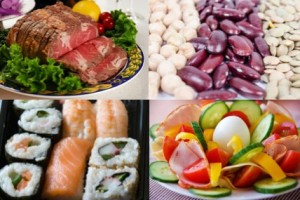 Your best doctor is no one else but you.
Your best doctor is no one else but you. 









 Gemma Calzada es doctora en Salud Holística y terapeuta GAPS. Su objetivo es mejorar la salud con la nutrición y el estilo de vida, y ayudar a las personas que sufren intolerancias alimentarias a vivir felices.
Gemma Calzada es doctora en Salud Holística y terapeuta GAPS. Su objetivo es mejorar la salud con la nutrición y el estilo de vida, y ayudar a las personas que sufren intolerancias alimentarias a vivir felices. 
